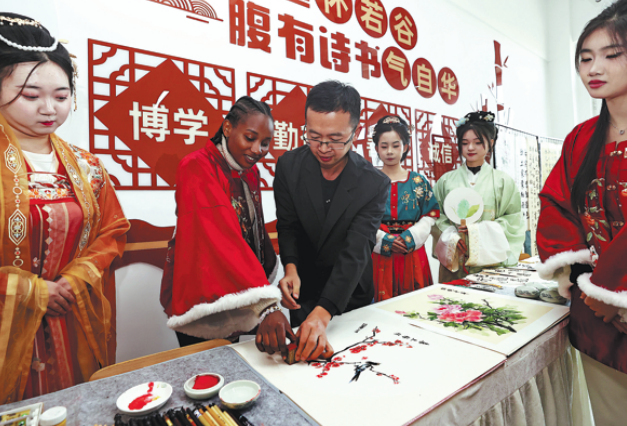More African youth seek higher studies in China
By OTIATO OPALI in Nairobi, Kenya | China Daily | Updated: 2025-04-03 09:34

The number of African students opting to travel to China for further studies has witnessed incredible growth over the past decade, with experts attributing the increase to growing economic and cultural exchanges between the regions.
Henry Rotich, chairman of the Kenya-China Alumni Association, said this growth is driven by several factors, including expanded scholarship opportunities, China's affordability as a study destination and the rising demand for African professionals with Chinese language proficiency.
"In Kenya, for example, the Chinese government used to offer an average of 10 scholarships per year twenty years ago. Today, the Chinese embassy in Nairobi alone sponsors at least 60 students annually," said Rotich, who studied in China for his master's degree in chemistry back in 1998.
"Additionally, private universities, local governments and self-sponsored students account for more than half of the total Kenyan student population in China. This reflects a multifold increase over the past two decades," he added.
Beyond long-term scholarships for undergraduate, master's and PhD studies, Chinese companies operating in Africa also sponsor students for short-term training, further boosting the numbers.
According to Rotich, China has emerged as a cost-effective destination compared with other international study venues, leading to an increase in self-sponsored and privately sponsored students opting for further studies in China.
Studying in China not only provides students with academic qualifications but also immerses them in a new language and culture, enhancing their global competitiveness, he said.
Different levels
Rotich said the number of African students in China has been boosted by the fact that students nowadays go to China for different levels of study — like bachelor's and master's degree programs as well as doctoral studies.
There are also opportunities for certificate and diploma-level programs. These include specialized cultural and professional training in areas such as wushu (martial arts), research and development collaborations between African and Chinese universities as well as technical training programs in engineering, technology and business.
"The rise in number of Kenyan graduates from China has led to significant contributions to various sectors in the country. These include infrastructure and engineering like engaging in major projects such as the Standard Gauge Railway," Rotich said.
"They are also making contributions in government and public service, the private sector and business as well as education by teaching the Chinese language in schools, universities and Confucius Institutes."
Joseph Maritim, treasurer of the Kenya-China Alumni Association, pointed out that prospects for Africa-China educational collaboration are promising. The association is working closely with both the Kenyan and Chinese governments to pursue further cooperation.
"We are seeking increased investment in vocational training to meet Kenya's growing labor market needs. We are also working on enhanced joint research initiatives between Kenyan and Chinese institutions. We will strengthen bilateral agreements to facilitate smoother transitions for students and professionals," Maritim said.
He added that the exchange of knowledge is not a one-way road. Some Chinese students, often due to their parents relocating to Africa for business or employment, take advantage of existing exchange programs to study in Kenyan public and private universities.
Additionally, personal interest in African studies has led some Chinese students to seek education in Kenya, facilitating cultural and academic exchanges between the two nations.
To further expand the cooperation in education, Maritim said they are working to strengthen alumni engagement and networking, to create strong and structured support for returning graduates in the Kenyan job market as well as to create institutionalized exchange programs and government-backed initiatives.
"As cooperation between the two nations deepens, education will remain a crucial pillar of the Kenya-China relationship, ensuring mutual growth and development," Maritim said.
























